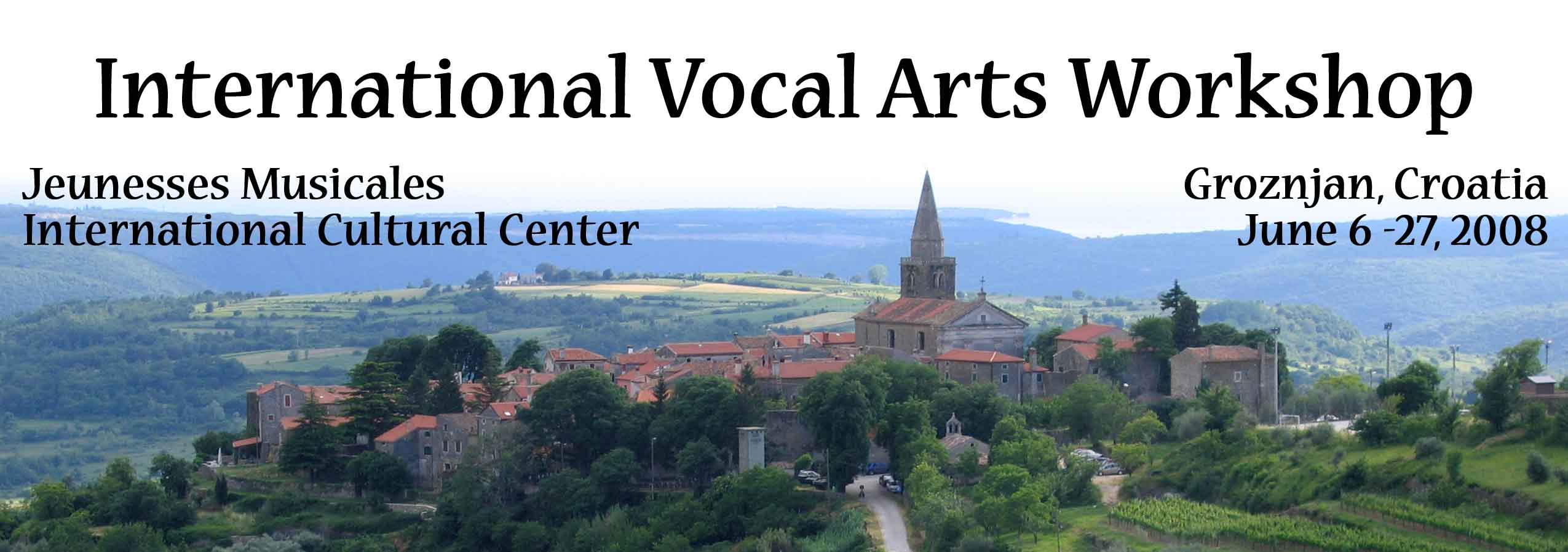|
Most days include classes, rehearsals, and individual practice time, and may sometimes include dance, artwork, and staging. Class time includes group work, individual coaching, and masterclasses. Our vocal work includes body movement, mind and body imagery, and inventive vocalises to build sound vocal technique. Our goal is for each student to develop an individual and independent approach to vocal study. Some of this work happens outside under the olive trees and some in our studios and practice rooms--all with lovely views of Groznjan and the surrounding hills and valleys.
Our choices of repertoire are wide-ranging and responsive to the needs of the students. In past years we began with unaccompanied song (medieval, traditional, blues), developing techniques to sustain a steady sound and evocative interpretation. From there we explored works by classical, theatre, and jazz composers such as Falla, Dvorak, Ravel, Bowles, and Ellington. Some students work intensively on Opera arias, Baroque music, Musical Theatre, and popular styles. We are excited by all of this and inclusive in our approach. We particularly welcome our work with instrumentalists and ensembles. As an additional highlight, some participants may bring in music from their own distinct cultures and teach us from these traditions. This gives us the chance to experience a wide range of styles, expand vocal capabilities, and generate increased appreciation across cultures. Vocal mastery and interpretive skills are stressed in preparation for our concert performances; spontaneity and a high-spirited interaction with the audience in our street theater performance.
This year, in addition to our conservatory approach and our concert hall performance, we will be exploring classical South Indian dance and song with Kamini Dandapani, Philippine and Balkan singing styles and Philippine dance with Eleanor Lipat-Chesler, and Brazilian carnival performance and capoeira with Olinda Brasil. Kasia Tercz & Robert Wojciechowski will teach stilt-walking, puppetry, and acting technique. Jose Garcia Leon will work intensively with instrumentalists on chamber music. Drawing on all these, we will work collaboratively under Jane McMahan's direction to imagine, develop, and present this summer's original street theatre performance.
SYMPOSIUM
Since the inception of the workshop, a day has been devoted to a symposium in which students, performers, and scholars have presented papers and discussions around a chosen theme of interest to us. Past symposia have included:
East European Traditional Music and Theatre in Performance (2005)
Traditional Music and Theatre in Worldwide Performance (2006)
Traditional Structures in Contemporary Performance (2007)
This past June our keynote speaker was writer and radio commentator Hartmut Topf from Berlin, who discussed art and politics in terms of his own humanitarian work as well as recent performances he had observed.
The next symposium will take place on Saturday, June 21, 2008, on External and Internal Influences on Vocal Forms and Styles. We are inviting presentations from such vantage points as Music Performance, Ethnomusicology, Anthropology, Theatre, Sociology, and Comparative Literature. If you are interested in submitting a paper or would like further information, please contact Jane McMahan (Barnard College - jm657@columbia.edu) and Amy Frishkey (UCLA - afrishkey@gmail.com).
|

